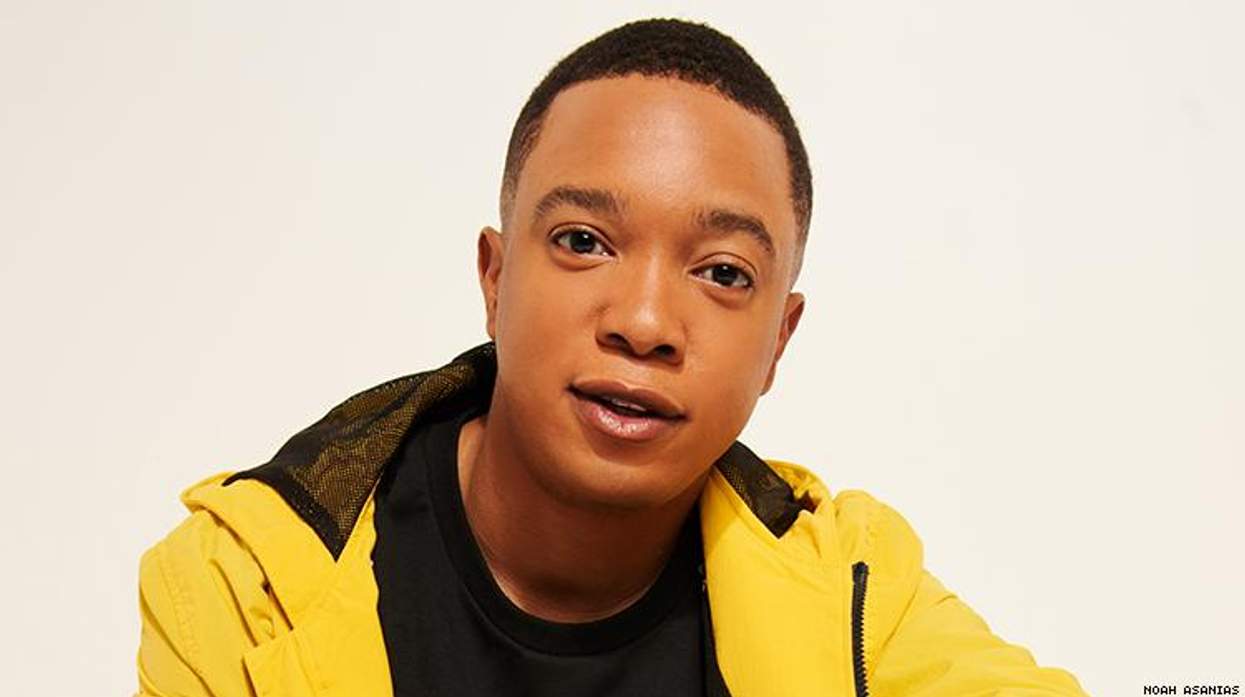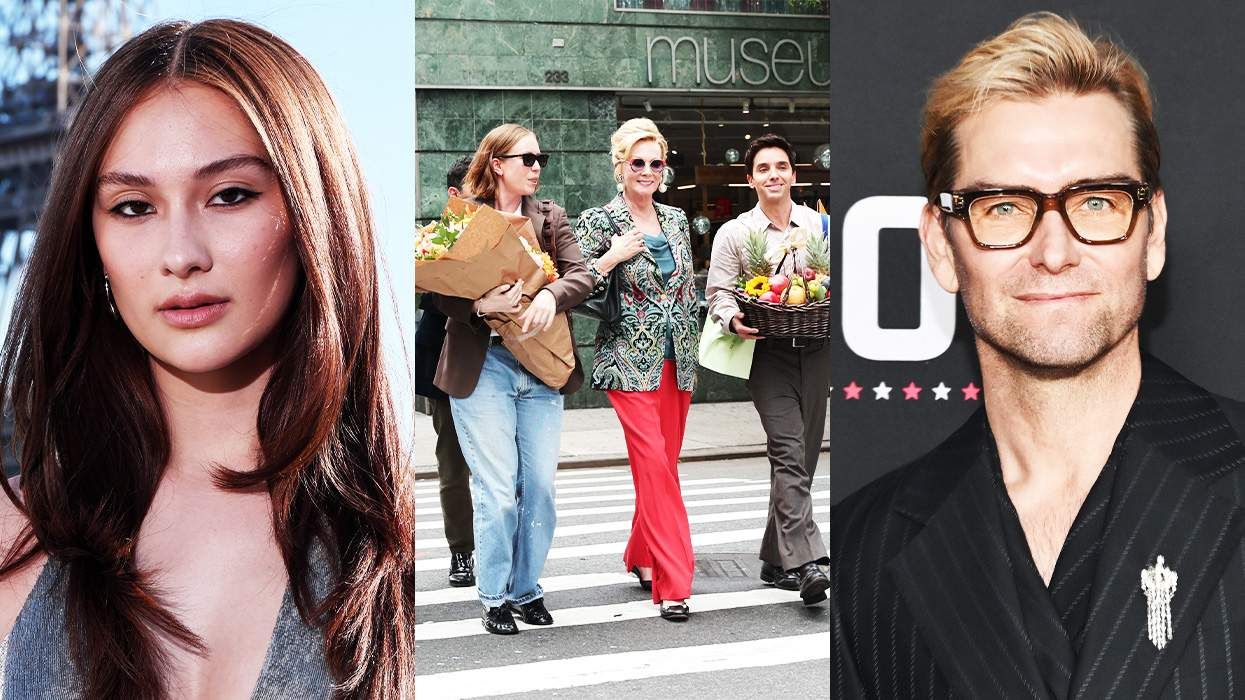Longtime fans of Designated Survivor -- the political thriller starring Kiefer Sutherland as a government official who suddenly succeeds to the presidency after an explosion -- may be surprised by the show's rebirth on Netflix, which picked up the series for a third season after its ABC cancellation.
Kiefer Sutherland still stars as President Thomas Kirkman -- who is now fighting to actually be elected as commander in chief, rather than winning a deadly lottery. Kal Penn, Adan Canto, Italia Ricci, and Maggie Q also return as series regulars.
However, freed from the constraints of network television, and now helmed by gay showrunner and executive producer Neal Baer, Designated Survivor has come out of the queer closet in many respects. The president may still be a white straight man, but the people and storylines around him are deeply tied to LGBTQ identities. His sister-in-law, for example, is a transgender woman -- portrayed by Sense8 actress Jamie Clayton -- and the political controversy around her gender identity figures prominently in an early episode.
Baer "really wanted to bring issues, especially for the LGBTQ community ... inside this political show," attested Benjamin Charles Watson, who portrays Dontae Evans, a social media whiz serving in Kirkman's administration and election campaign.
Dontae is the access point for many of the LGBTQ issues on Designated Survivor. The character is gay, but his sexual orientation -- revealed in a scene through a casual kiss with his partner -- is not his defining characteristic. For Watson, who is gay, this treatment was a key draw for why he wanted to play Dontae.
"I love playing characters that are gay," said Watson, who previously played a queer character, Tariq, on The L.A. Complex. However, he stipulated, "I love playing characters that it's not about them being gay. There is more to them. They have a purpose, they want something in life that they're not getting."
Watson, who is speaking about his sexual orientation for the first time publicly in this interview, feels this way about his own identity. Describing himself, he said, "Watson is an actor. He is a brother. He is so many other things [than] gay."
Dontae's complexity is what makes him "groundbreaking," Watson said. In addition to mapping out social media strategies for the president of the United States, the character also has a meaningful -- and complicated -- relationship with another man. Evans is HIV-positive, and the disclosure of his status to his partner -- after they had sex -- is one of the key dramatic scenes early in the season.
Preparing for that scene was "the hardest thing ever," said Watson, who struggled to understand why his character did not have that conversation earlier in his relationship. Watson believes his character is "not apologetic" about being HIV-positive. However, after doing some research into the lives and experiences of African-American HIV-positive men, the actor now better understands how stigma and a fear of rejection can keep someone silent about their status -- even when it comes to someone they care for.
"There's so much stigma around it in the world -- that if you say you are HIV-positive, undetectable or not, people look at you as dirty and filthy," Watson said. "Dontae just did not want to feel like that."
This storyline challenged Watson to tackle his own stigma around HIV. "He got me over a lot of stigma that I had that I'd never knew that I had, to be honest. And then he made me into a stronger individual," he said.
The representation of a character who is both black and HIV-positive is important to the media landscape -- in the real world, half of black gay and bi men will get HIV in their lifetimes, yet their experiences are still rarely seen in television and film.
Watson hopes that his character, by giving a face to men like Dontae, helps fight stigma in the world and also educate viewers about "undetectable = untransmittable," the announcement from the Centers for Disease Control and Prevention assuring that if HIV-positive people like Dontae regularly take their medication and suppress the virus to an undetectable level, they cannot pass it on to others.
Dontae also gave Watson the opportunity to rethink the laws that criminalize issues like an HIV-positive person's disclosure to sexual partners. "When it comes to HIV criminalization, I believe the law absolutely needs to be changed. These laws were created in a time of panic, chaos, and fear and no longer reflect the new world we live in," said Watson, who believes modern science -- divorced from stigma -- must be taken into account in the law.
In addition to conversations around HIV, Dontae also introduced Designated Survivor viewers to a milestone in television -- a passionate sex scene between men of color. As an actor, Watson is "always scared about filming sex scenes," but he took steps to make sure he and his scene partner were comfortable. He called him before they met on set and discussed their characters, story arc, and the scene in question. By the time it came time to roll cameras, "it just felt so comfortable that it felt like I was with my best friend," said Watson.
"It felt -- weirdly - just absolutely fine and absolutely amazing and intimate and it was just really good," he said. "Hopefully, that comes across as very loving to everyone that's watching it."
"I'm just going to tell my mom to avert her eyes just for a couple of minutes," Watson added with a laugh.
Watson recognizes the significance of his character and the representation he brings to media. Born in Jamaica, Watson moved to Toronto when he was age 10. He remembered the first time watching LGBTQ characters -- on Showtime's Queer as Folk. Watson taped the groundbreaking gay series and watched the show when his parents would leave the house.
"All of a sudden, I understood what was going on inside of me and my attraction to men," said Watson. "It made me feel good and made me OK with what I was and who I was as a person, as a black man, as a Jamaican guy who all of a sudden is in a completely new world in Toronto."
However, it would take some time before Watson could feel comfortable enough with his gay identity to come out publicly. It was his gay role on The L.A. Complex and the outpouring of love he received for that character that marked a major turning point in his journey.
"I was afraid if I came out that it would affect my acting career," Watson admitted. "But I'm also getting all these messages from men all over the world and an even from my home country Jamaica that said, 'Thank you so much for telling my story.'"
Jamaica has been called "the most homophobic country in the world" by some media outlets. While this designation has been debated by activists, sex between men is illegal in the island nation, and LGBTQ people there do face high rates of violence and discrimination.
Watson, who is now in his 30s, first came out to his mother at age 24. She cried, and the pair would not talk about it again for some time. "For a black Jamaican mom, it's a process," said Watson. He essentially had to come out to his mother a second time -- with a better reaction -- and happily, he now describes their relationship as "best friends."
Another major step in his coming out? Watson visited the home of a prominent black gay actor -- he wouldn't reveal his name -- and his husband. The experience offered him a possibility model for navigating Hollywood as an out man of color. "They were having dinner, joking around, and chatting. I was like, this is absolutely just normal. Like, it's totally fine. And he still works a lot!" said Watson.
But ultimately, it was Dontae himself who gave Watson the courage to finally speak his truth. "It was time to come out," said Watson, who said the experience of giving life to this gay character made him come to that realization. "Life is just too short. And honestly, at the end of the day, I'm just tired of living a weird lie. I just want to be who I am. I want to find a husband and have kids and a dog and travel the world and create a business. I want people in Jamaica to realize that you can be gay and totally be fine with yourself."
"Coming out, I have the ability to help a lot of individuals that are struggling with their sexuality," he said. "Because for me, I know it was very hard to understand and figure out and ultimately come out. And coming out was probably the greatest thing I've ever done in my entire existence."
Watson also has a message for these individuals. "I just want everyone who is struggling with their sexuality to just know, one, it gets better. And two, it doesn't change who you are as a person," said Watson, who hopes to one day make his own TV series that speaks to his experience as a gay Jamaican Canadian.
For these reasons, Watson -- who gained some political acumen acting as a member of the Kirkman administration, as well as working alongside Penn, who was a member of the real-life Obama administration -- throws his support behind Pete Buttigieg for president. Watson recalled the hope that was ignited after Barack Obama was elected, and he believes another victory from a member of a marginalized community would send a powerful message to the world about LGBTQ equality.
"Having the first gay president would be the craziest thing because it should not be about your sexuality," said Watson. "It should be about, what is your purpose? What do you want to do and what do you want to accomplish? Being gay is just who you are. But it should not stop you from doing and having all these policies and things that you want to do to help people and also help America."
"I want the first gay president," he added. "I cannot vote in this country, but gosh darn it. ... I wish I could vote!"
And after participating in a fictional election campaign, what advice would Watson have for Buttigieg? "Find a way to connect to the little man," said Watson, who also emphasized youth outreach. "You need to touch young individuals that are coming up that want a better world. You need to express that you're able to give them a better life, and a better world, and they can have anything they want in America."
Season 3 of Designated Survivor is now streaming on Netflix. Watch the trailer below.















Charlie Kirk DID say stoning gay people was the 'perfect law' — and these other heinous quotes
These are some of his worst comments about LGBTQ+ people made by Charlie Kirk.